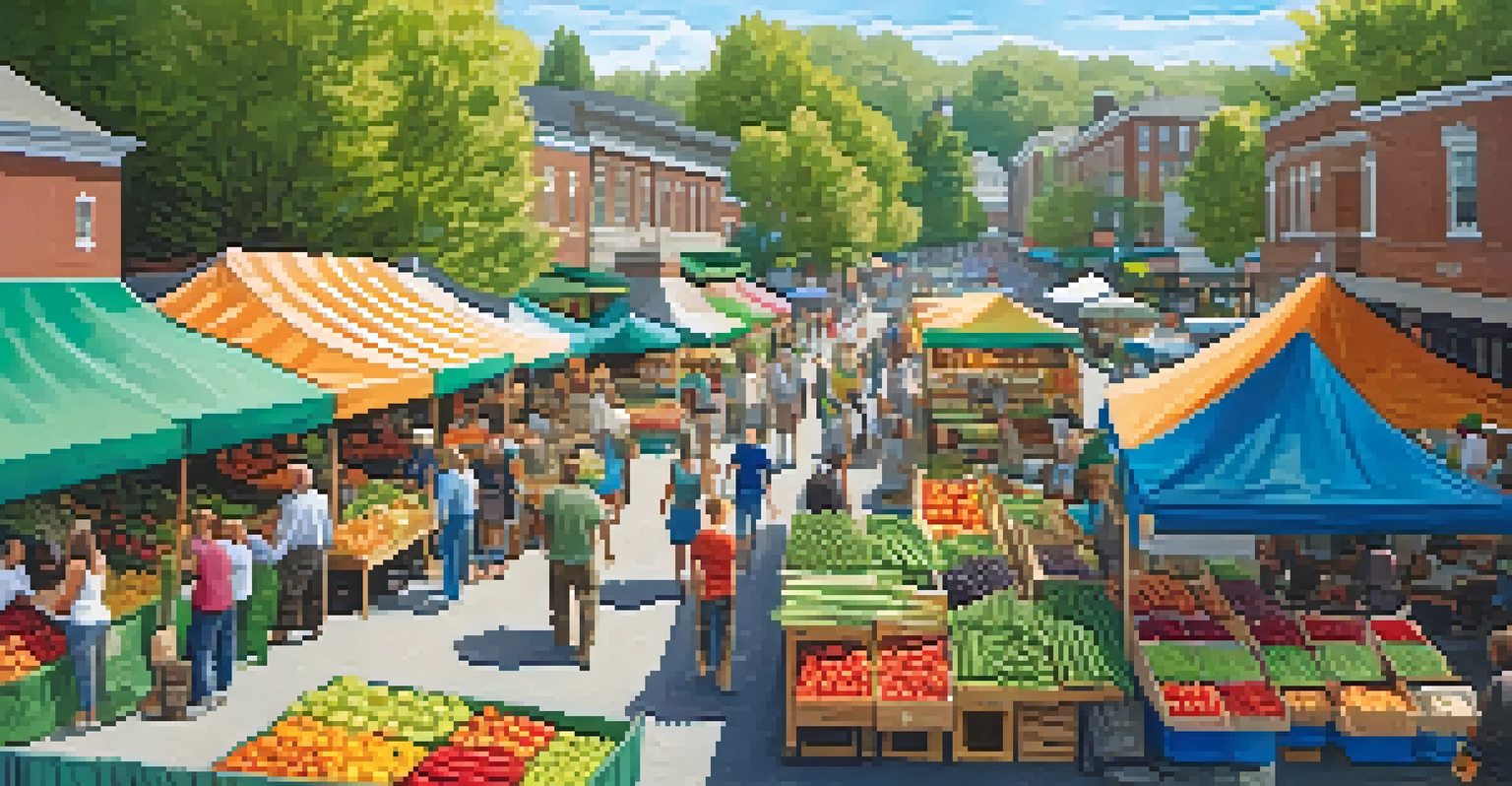Exploring the Link Between Climate and Agriculture in WA

Overview of Agriculture in Washington State
Washington State is a cornerstone of U.S. agriculture, known for its diverse crops and robust farming practices. From apples and cherries to wheat and hops, the state produces a wide array of agricultural products that contribute significantly to the economy. The state's unique geography, with its mountains and coastal areas, provides a variety of microclimates, allowing for this diversity.
The farmer is the one who plants the seed, nurtures it, and ultimately reaps the rewards, but it is the climate that determines how bountiful that harvest will be.
However, this bounty is not without challenges, especially in the face of climate change. Farmers in Washington are increasingly recognizing the need to adapt their practices to ensure sustainability and productivity. This article explores the intricate relationship between climate and agriculture in Washington, shedding light on how changes in weather patterns affect farming.
Understanding this link is crucial for both farmers and consumers, as it impacts food security and the local economy. By examining the interplay between climate factors and agricultural output, we can better appreciate the vital role of sustainable practices in maintaining Washington's agricultural legacy.
Climate Change: Key Factors Affecting Agriculture
Climate change introduces a host of factors that can disrupt agricultural practices. Rising temperatures can lead to heat stress in crops, adversely affecting yields. Additionally, changes in precipitation patterns can result in either droughts or flooding, both of which pose significant risks to farming operations.

For example, in recent years, some regions in Washington have experienced unprecedented drought conditions, compelling farmers to rethink their irrigation strategies. Conversely, other areas have faced heavy rainfall, leading to soil erosion and crop damage. These scenarios highlight the need for farmers to remain agile and adapt to these shifting climate variables.
Adaptation is Key for Farmers
Farmers in Washington are adopting innovative practices to combat the challenges posed by climate change and ensure sustainability.
Moreover, climate change can also influence the prevalence of pests and diseases, which can further threaten crop health. Understanding these factors is vital for developing strategies that can mitigate risks and enhance resilience in agriculture.
Adapting Farming Practices to Climate Challenges
To combat the challenges posed by climate change, many farmers in Washington are adopting innovative practices. Techniques like crop rotation, cover cropping, and integrated pest management are becoming more popular as they promote soil health and biodiversity. These practices not only enhance resilience but also improve overall farm productivity.
Sustainability is not a goal to be reached, but a way of thinking and living that we must adopt for the health of our planet and future generations.
Additionally, many farmers are investing in technology to monitor weather conditions and soil health more effectively. This data-driven approach allows for more precise decision-making regarding planting times, irrigation needs, and pest control. For instance, using drones to assess crop health can provide immediate insights that help farmers respond quickly to changing conditions.
These adaptations underscore the importance of sustainability in agriculture. By prioritizing environmentally friendly practices, farmers can not only safeguard their crops but also contribute to the broader goal of combating climate change.
The Role of Government and Policy in Agriculture
Government policies play a crucial role in shaping agricultural practices in Washington State. Programs aimed at promoting sustainable agriculture, research funding, and subsidies for environmentally friendly practices are essential in supporting farmers. Such initiatives not only help mitigate the effects of climate change but also ensure long-term food security.
For example, the Washington State Department of Agriculture has implemented various programs to assist farmers in adopting sustainable practices. These include grants for water conservation projects and education on climate-resilient crops. By providing resources and guidance, policymakers can empower farmers to make informed decisions.
Community Supports Local Agriculture
Local initiatives like farmers' markets and educational workshops are connecting consumers with farmers, promoting awareness, and fostering sustainable practices.
Moreover, collaboration between farmers, researchers, and government entities is vital for developing effective strategies. This collective effort can lead to innovative solutions that address the multifaceted challenges posed by climate change.
Community Efforts to Support Sustainable Agriculture
Local communities in Washington are increasingly recognizing the importance of supporting sustainable agriculture. Farmers' markets, community-supported agriculture (CSA) programs, and educational workshops are just a few examples of initiatives aimed at connecting consumers with local producers. These efforts not only bolster the local economy but also promote awareness of the challenges faced by farmers.
For instance, many communities are organizing events that highlight the importance of local food systems and sustainable practices. These gatherings offer opportunities for farmers to share their stories and educate consumers about the impact of climate on agriculture. Such connections foster a sense of community and encourage consumers to make informed choices about their food sources.
Furthermore, engaging the community in discussions about climate change and agriculture can lead to a more informed public. When consumers understand the challenges farmers face, they are more likely to support policies and practices that promote sustainability.
The Future of Agriculture in a Changing Climate
Looking ahead, the future of agriculture in Washington hinges on adaptability and innovation. As climate change continues to evolve, farmers must remain proactive in their approaches to farming. Embracing new technologies, such as precision agriculture and climate-smart practices, will be essential for maintaining productivity and sustainability.
Additionally, research and development will play a significant role in shaping agricultural practices. By investing in studies that focus on climate-resilient crops and sustainable farming techniques, the agricultural sector can better prepare for future challenges. Collaboration between universities, government, and the agricultural community will drive this progress.
Government Policies Matter
Supportive government programs and collaboration between stakeholders are essential for promoting sustainable agriculture and addressing climate challenges.
Ultimately, the resilience of Washington's agricultural landscape depends on the collective efforts of farmers, policymakers, and consumers. By fostering a culture of sustainability and innovation, we can ensure that agriculture continues to thrive despite the uncertainties posed by climate change.
Taking Action: How You Can Contribute
As individuals, we each have a role to play in supporting sustainable agriculture and addressing climate change. Simple actions, such as purchasing locally sourced produce, can make a significant impact. By choosing to support local farmers, consumers help strengthen the local economy and promote sustainable practices.
Additionally, educating ourselves and others about the importance of climate-resilient agriculture can drive community engagement. Sharing information through social media, attending local events, or participating in workshops can raise awareness and inspire action. The more we discuss these issues, the more likely we are to see positive change.

Finally, advocating for policies that support sustainable agriculture is crucial. Whether it’s contacting local representatives or participating in community forums, your voice matters. Together, we can create a future where agriculture thrives in harmony with our changing climate.